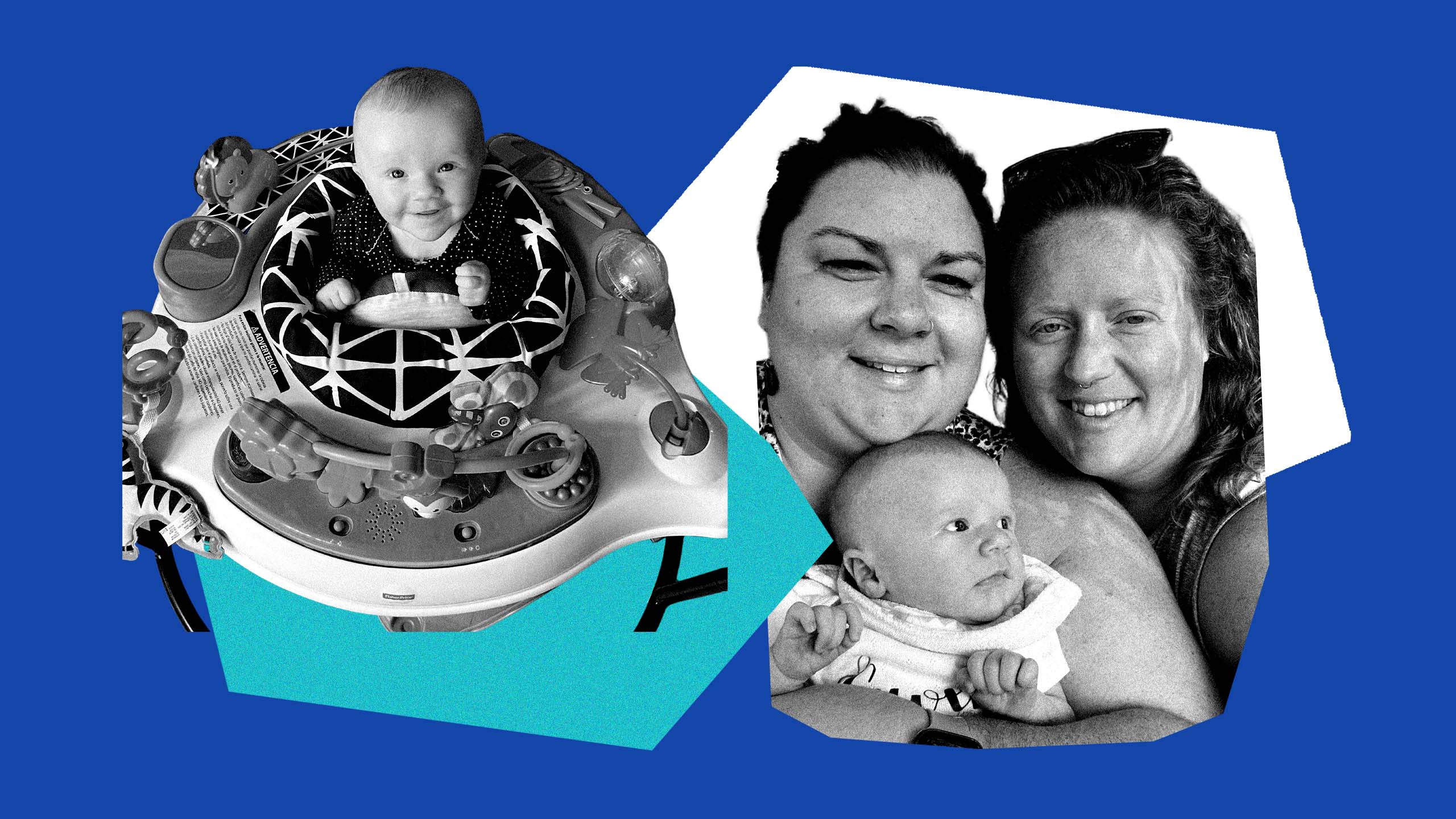A lesbian couple from Wolfville, Nova Scotia, is speaking out about being unable to register both of their names as parents on their daughter’s birth certificate—despite the fact that the department of Vital Statistics updated their regulations in 2007 to allow same-sex couples to be listed as parents.
Caitlin and Stacey Lamrock have been married for seven years and had their first baby, Gwendolyn, in mid-July at the IWK Health Centre in Halifax. While Caitlin, 33, carried their baby via sperm donor, she and Stacey, 37, say having two kids was always in the cards for them—but after running into complications while trying to get Stacey registered on Gwendolyn’s birth certificate as her second parent, the process has proved more difficult than they could have imagined.
The couple who, in true lesbian fashion, married in December 2015 after meeting earlier that year, also own a farm together, which they purchased in 2020. Although they always planned to have two kids, they waited until they were settled, and eventually found themselves in a Facebook group for sperm donors and recipients, which is how they met Gwendolyn’s biological father.
“We knew his name and a brief medical history; we don’t know him personally. This would be our only interaction,” Stacey said.
However, the couple says they came across two options when filling out the registry of birth: “assisted fertility” and “known donor.” Because they didn’t go through a fertility clinic, but instead had a home insemination, they didn’t think it was an assisted conception. They then received a letter from the province’s Vital Statistics department, which stated that because the couple hadn’t used assisted conception, Stacey would have to formally adopt Gwendolyn in order to be listed as her parent.
Although the couple did not have the process notarized, the Lamrocks say their donor had willingly signed a formal contract stating he wouldn’t terminate the couple’s claims to their own child. However, Vital Statistics told Stacey that the technicality of being listed as “known” gives him the ability to come back and play for custody in the future. The Lamrocks were also told that if they had chosen “assisted conception,” the donor would not have been confirmed as a known parent, and Stacey would have been put on the birth certificate. (Currently, individual provinces present different challenges for same-sex couples looking to register their parental status on their children’s birth certificates. According to Prowse Chowne LLP, an Alberta-based law firm, the policy that forces non-biological parents to adopt or declare second parentage after the donor forfeits their rights applies to the entire country.)
With Caitlin unable to perform day-to-day chores such as cleaning stalls, the farmwork fell on Stacey during the pregnancy. They went to every doctor’s appointment together, and Stacey was present during what ended up being a long and arduous delivery process. When Caitlin was induced and eventually had a Caesarean section, Stacey remained in the hospital room. During the 14 days Caitlin remained in the hospital, it was up to Stacey to both provide her wife moral support at the hospital, and to manage the farm at home.
“Stacey was well committed to being a parent since before our daughter was here,” Caitlin told Xtra over the phone.
“We did everything at home too, as well as getting up at three in the morning to feed her,” Stacey added. “We both took on that challenge … it’s been a very equal share the entire process.”
The two plan to eventually go ahead with the adoption process—but with Stacey currently completing her Bachelor of Commerce at St. Mary’s University, they say that covering adoption costs is “not feasible” for them at the moment.
“We called and spoke to a lawyer, and the cost is upward of $4,000 or more. So it is quite a substantial burden and financial burden to anybody, as well as ourselves,” Stacey added. “It’s definitely a hard pill to swallow. Because I feel like if they’re not getting you on one end—you know, the fertility clinic costs—then it’s like you have to spend this money another way. To me, it seems almost like a gimmick.”
They have also submitted a request to have a conversation with the Nova Scotia Human Rights Commission, in order to eventually move forward with a human rights complaint, but with a wait time upward of four weeks, they expect there “to be quite a delay.”
In the meantime, however, the couple says motherhood has been “tiresome” but “amazing.”
“Gwen is really a great baby,” Stacey chuckled. “Smiles all the time, has just been a very happy baby. So, life has just just been fantastic.”


 Why you can trust Xtra
Why you can trust Xtra


